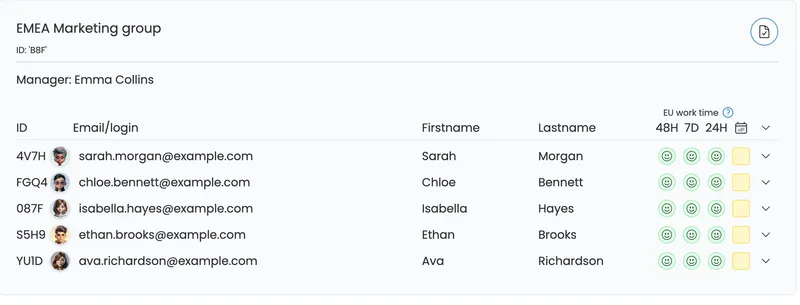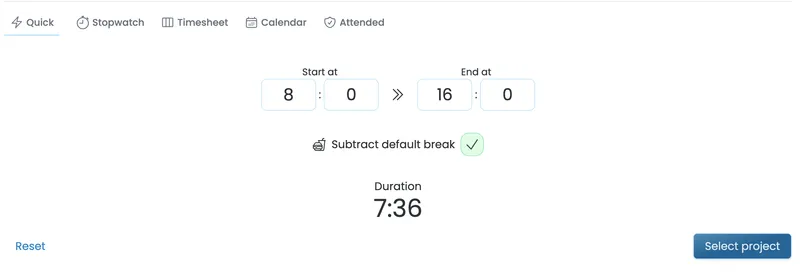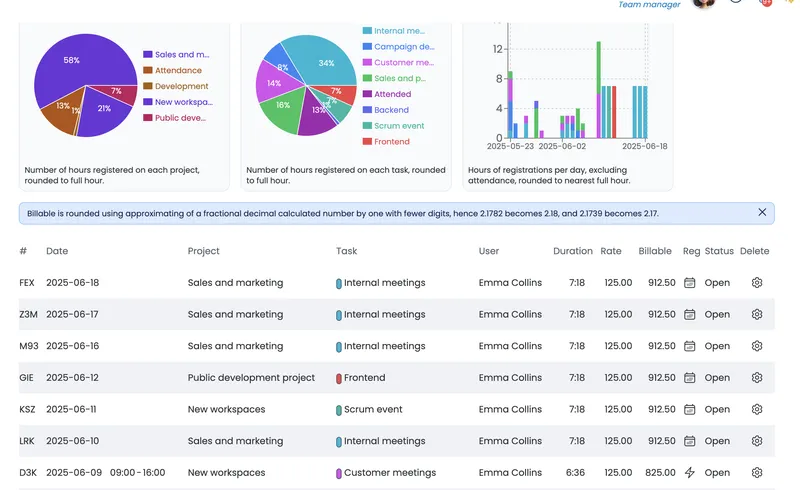Working Time Directive: 5 things you didn’t know
Published {$created} by Tina Blum
If you live and work in the EU, the Working Time Directive affects your work life. You have probably already been introduced to new ways of tracking your work time, or been "warned" that it is on its way.
The Working Time Directive is meant to protect workers from overwork, unsafe schedules, and burnout. But many employers (and even employees) don’t fully understand how it works — or what it requires.
Let’s have a look at what the Working Time Directive is, why compliance matters, and 5 things most teams overlook.
Also read our other blogpost about the EU Working Time Directive
What is the Working Time Directive?
The Working Time Directive (Directive 2003/88/EC) is an EU law that sets limits on working hours, mandates rest periods, and ensures workers well-being. It applies to most employees in EU member states and outlines rules like maximum weekly hours, minimum daily and weekly rest, and mandatory breaks.
Why compliance matters more than ever
After Covid we saw a rise of remote work, flexible schedules, and hybrid teams, working hours are no longer limited to traditional 9-to-5 setups. This makes time tracking — and compliance — more complex, but also more important.
Failing to comply with the directive can lead to fines, legal challenges, and employee dissatisfaction.

5 facts about the EU Working Time Directive most teams overlook
1. The 48-hour rule is an average
The directive limits the average working week to 48 hours — but this is over a reference period, not necessarily week by week.
In most EU countries, that period is 4 months. This means you might work 60 hours one week and 35 the next — as long as the average stays below 48.
Tip: Use a time tracking system that can calculate rolling averages automatically.
2. Breaks and rest periods are mandatory
Workers are entitled to:
A minimum 11-hour daily rest between shifts
A 24-hour weekly rest period
A break if the working day is longer than 6 hours (usually 20–30 minutes)
If your business doesn’t track breaks, you could be out of compliance — even unintentionally.
Tip: Use Nureti to subtract default breaks or let employees log them manually.

3. It applies even to flexible and remote work
Just because someone works from home or sets their own hours doesn’t mean the directive doesn’t apply.
The law covers all types of work arrangements, including freelancers, remote teams, and part-time workers — as long as there’s an employment relationship.
Tip: Make time tracking part of your remote work policy — and choose tools that work on all devices.
4. Records must be kept — and presented
Employers must keep detailed records of working time to prove compliance if requested by authorities.
This includes:
When work started and ended
Total hours worked
Breaks taken
Paper-based logs and memory-based reporting are risky.
Tip: Nureti stores a full history of time logs — searchable and exportable at any time.

5. Non-compliance can be expensive
Fines for breaching the Working Time Directive vary by country, but they can be significant — especially if violations are repeated or affect many employees.
Even worse? Potential damage to employee well-being, satisfaction, and trust.
Tip: Build a compliance-first culture — and support it with the right tools.
How to track working hours accurately
Accurate time tracking is the foundation of compliance. It allows you to:
Monitor total hours worked
Log breaks and rest time
Identify overwork risks
Manual methods (paper, spreadsheets) are error-prone and inefficient.
Tip: Choose a digital time tracking system that’s easy to use and works across desktop and mobile.
How Nureti supports Workting Time Directive compliance (with examples)
Nureti helps your team stay compliant by offering:
Real-time tracking via stopwatch or calendar view
Break registration (manual or automated)
Access control to ensure only managers and admins can view team hours
Reporting tools to generate evidence of compliance instantly
Whether you're tracking a field technician's day or a developer's work hours, Nureti helps you stay accurate, consistent, and compliant.
Want easy compliance with minimal effort?
The Working Time Directive isn’t going away — and neither is the responsibility to follow it.
Try Nureti for free and take the guesswork out of time tracking compliance.